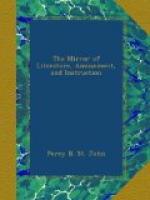* * * * *
Such is an outline of the histories of the annexed three Boroughs. Two of them are sites of great beauty; and we leave the reader to reflect on these pleasant features in association with their rise, decline, and we opine, political extermination.
* * * * *
MANNERS & CUSTOMS OF ALL NATIONS.
* * * * *
ORIGIN OF THE COBBLER’S ARMS.
Charles V., in his intervals of relaxation, used to retire to Brussels. He was a prince curious to know the sentiments of his meanest subjects, concerning himself and his administration; he therefore often went out incog. and mixed in such companies and conversations as he thought proper. One night his boot required immediate mending; he was directed to a cobbler not inclined for work, who was in the height of his jollity among his acquaintance. The emperor acquainted him with what he wanted, and offered a handsome remuneration for his trouble.
“What, friend,” says the fellow, “do you know no better than to ask any of our craft to work on St. Crispin? Was it Charles the Fifth himself, I’d not do a stitch for him now; but if you’ll come in and drink St. Crispin, do, and welcome—we are merry as the emperor can be.”
The sovereign accepted his offer; but while he was contemplating on their rude pleasure, instead of joining in it, the jovial host thus accosts him:
“What, I suppose you are some courtier politician or other, by that contemplative phiz!—nay, by your long nose, you may be a bastard of the emperor’s; but, be who or what you will, you’re heartily welcome. Drink about; here’s Charles the Fifth’s health.”
“Then you love Charles the Fifth?” replied the emperor.
“Love him!” says the son of Crispin, “ay, ay, I love his long-noseship well enough; but I should love him much more, would he but tax us a little less. But what the devil have we to do with politics! Round with the glass, and merry be our hearts!”
After a short stay, the emperor took his leave, and thanked the cobbler for his hospitable reception. “That,” cried he, “you’re welcome to; but I would not to day have dishonoured St. Crispin to have worked for the emperor.”
Charles, pleased with the honest good nature and humour of the fellow, sent for him next morning to court. You may imagine his surprise, to see and hear that his late guest was his sovereign: he was afraid his joke on his long nose would be punished with death. The emperor thanked him for his hospitality, and, as a reward for it, bid him ask for what he most desired, and to take the whole night to think of it. The next day he appeared, and requested that for the future the cobblers of Flanders might bear for their arms a boot with the emperor’s crown upon it.
That request was granted; and so moderate was his ambition, that the emperor bid him make another. “If,” says the cobbler, “I might have my utmost wish, command that for the future the company of cobblers shall take place of the company of shoemakers.”




